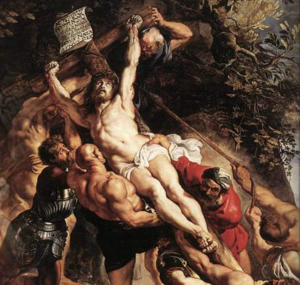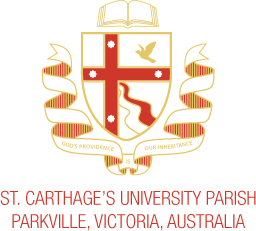Entrance Antiphon
We should glory in the Cross of our Lord Jesus Christ,
in whom is our salvation, life and resurrection,
through whom we are saved and delivered.
First Reading: Numbers 21:4-9. A reading from the book of Numbers
When those that were afflicted looked upon it, they were healed.
On the way through the wilderness, the Israelites lost patience. They spoke against God and against Moses, ‘Why did you bring us out of Egypt to die in this wilderness? For there is neither bread nor water here; we are sick of this unsatisfying food.’
At this God sent fiery serpents among the people; their bite brought death to many in Israel. The people came and said to Moses, ‘We have sinned by speaking against the Lord and against you. Intercede for us with the Lord to save us from these serpents.’ Moses interceded for the people, and the Lord answered him, ‘Make a fiery serpent and put it on a standard. If anyone is bitten and looks at it, he shall live.’ So Moses fashioned a bronze serpent which he put on a standard, and if anyone was bitten by a serpent, he looked at the bronze serpent and lived.
Responsorial Psalm: Do not forget the works of the Lord!
- Give heed, my people, to my teaching;
turn your ear to the words of my mouth.
I will open my mouth in a parable
and reveal hidden lessons of the past. (R.)
- When he slew them then they would seek him,
return and seek him in earnest.
They would remember that God was their rock,
God the Most High their redeemer. (R.)
- But the words they spoke were mere flattery;
they lied to him with their lips.
For their hearts were not truly with him;
they were not faithful to his covenant. (R.)
- Yet he who is full of compassion
forgave their sin and spared them.
So often he held back his anger
when he might have stirred up his rage. (R.)
Second Reading: Philippians 2:6-11. A reading from the letter of St Paul to the Philippians
He humbled himself, therefore God had exalted him.
The state of Jesus was divine,
yet he did not cling
to his equality with God
but emptied himself
to assume the condition of a slave,
and became as men are;
and being as all men are,
he was humbler yet,
even to accepting death,
death on a cross.
But God raised him high
and gave him the name
which is above all other names
so that all beings
in the heavens, on earth and in the underworld,
should bend the knee at the name of Jesus
and that every tongue should acclaim
Jesus Christ as Lord,
to the glory of God the Father.
Gospel Acclamation: Alleluia, alleluia! We adore you, O Christ, and we praise you, because by your cross you have redeemed the world. Alleluia!
Gospel: John 3:13-17. A reading from the holy Gospel according to John
The Son of Man must be lifted up.
Jesus said to Nicodemus:
‘No one has gone up to heaven
except the one who came down from heaven,
the Son of Man who is in heaven;
and the Son of Man must be lifted up
as Moses lifted up the serpent in the desert,
so that everyone who believes may have eternal life in him.
Yes, God loved the world so much
that he gave his only Son,
so that everyone who believes in him may not be lost
but may have eternal life.
For God sent his Son into the world
not to condemn the world,
but so that through him the world might be saved.’
REFLECTION
The message of the Cross is not condemnation, but salvation. Not despair, but hope.
Such themes are strongly evident in Pope Leo’s comments on migrants and refugees. ‘In a world darkened by war and injustice,’ he says, ‘even when all seems lost, migrants and refugees stand as messengers of hope. Their courage and tenacity bear heroic testimony to a faith that sees beyond what our eyes can see and gives them the strength to defy death.’
Indeed, he suggests, they ‘remind the Church of her pilgrim dimension, perpetually journeying towards her final homeland.’
‘Their presence, then,’ the pope declares, ‘should be recognised and appreciated as a true divine blessing, an opportunity to open oneself to the grace of God, who gives new energy and hope to his Church.’
We too, in turn, have the opportunity to ‘be a living witness to hope, one that is understood as the promise of a present and a future where the dignity of all as children of God is recognised.’
We are called therefore to be people who welcome the stranger, manifesting the hope of the Cross where and when we can.
© Nick Brodie
